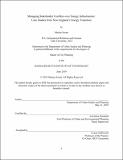| dc.contributor.advisor | Lawrence Susskind. | en_US |
| dc.contributor.author | Swain, Marian(Marian Carroll) | en_US |
| dc.contributor.other | Massachusetts Institute of Technology. Department of Urban Studies and Planning. | en_US |
| dc.coverage.spatial | n-usn-- | en_US |
| dc.date.accessioned | 2020-02-28T20:51:10Z | |
| dc.date.available | 2020-02-28T20:51:10Z | |
| dc.date.copyright | 2019 | en_US |
| dc.date.issued | 2019 | en_US |
| dc.identifier.uri | https://hdl.handle.net/1721.1/123922 | |
| dc.description | This electronic version was submitted by the student author. The certified thesis is available in the Institute Archives and Special Collections. | en_US |
| dc.description | Thesis: M.C.P., Massachusetts Institute of Technology, Department of Urban Studies and Planning, 2019 | en_US |
| dc.description | Cataloged from student-submitted PDF version of thesis. | en_US |
| dc.description | Includes bibliographical references (pages 111-118). | en_US |
| dc.description.abstract | Large-scale energy infrastructure projects often spark controversy over possible negative impacts on the environment, the local economy, or abutting properties. The transition to clean energy is exacerbating these conflicts, since it requires a substantial build-out of new energy infrastructure. In this thesis, I use a case study analysis of recent electricity transmission and offshore wind projects in New England to examine the key sources of stakeholder opposition and the impact of stakeholder conflicts on project outcomes. My four cases include both successful and failed projects: Hydro- Québec Phase I/II, Northern Pass, Cape Wind, and Vineyard Wind. Drawing on stakeholder interviews, public records, and media reports, I find that stakeholder conflicts contributed heavily to failed projects and played an important part in shaping the successful cases. The most common triggers of stakeholder opposition in these cases are visual and environmental impacts, concerns of competing industries, inter-state tensions, and efforts to exercise financial and political influence. I evaluate the factors that contribute to successful projects and offer recommendations for energy developers, policymakers, and regulators who want to make the energy facility siting process in New England more consensus-oriented, with the goal of helping the region accelerate its transition to clean energy. Keywords: siting, energy policy, public opposition, consensus-building, stakeholder engagement, electric transmission lines, offshore wind, New England. | en_US |
| dc.description.statementofresponsibility | by Marian Swain. | en_US |
| dc.format.extent | 119 pages | en_US |
| dc.language.iso | eng | en_US |
| dc.publisher | Massachusetts Institute of Technology | en_US |
| dc.rights | MIT theses are protected by copyright. They may be viewed, downloaded, or printed from this source but further reproduction or distribution in any format is prohibited without written permission. | en_US |
| dc.rights.uri | http://dspace.mit.edu/handle/1721.1/7582 | en_US |
| dc.subject | Urban Studies and Planning. | en_US |
| dc.title | Managing stakeholder conflicts over energy infrastructure : case studies from New England's energy transition | en_US |
| dc.type | Thesis | en_US |
| dc.description.degree | M.C.P. | en_US |
| dc.contributor.department | Massachusetts Institute of Technology. Department of Urban Studies and Planning | en_US |
| dc.identifier.oclc | 1140072907 | en_US |
| dc.description.collection | M.C.P. Massachusetts Institute of Technology, Department of Urban Studies and Planning | en_US |
| dspace.imported | 2020-02-28T20:51:09Z | en_US |
| mit.thesis.degree | Master | en_US |
| mit.thesis.department | UrbStud | en_US |
